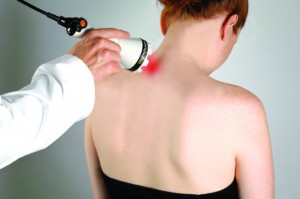 Cold Laser Therapy or Low Level Laser Therapy (LLLT) is a treatment that utilizes specific wavelengths of light to interact with tissue and is thought to help accelerate the healing process. It can be used on patients who suffer from a variety of acute and chronic conditions in order to help eliminate pain, swelling, reduce spasms and increase functionality.
Cold Laser Therapy or Low Level Laser Therapy (LLLT) is a treatment that utilizes specific wavelengths of light to interact with tissue and is thought to help accelerate the healing process. It can be used on patients who suffer from a variety of acute and chronic conditions in order to help eliminate pain, swelling, reduce spasms and increase functionality.How Does Laser Therapy Work?
Lasers are handheld devices used by the clinician and are often the size of a flashlight. The laser is placed directly over the injured area for 30 seconds to several minutes, depending on the size of the area being treated and the dose provided by the cold laser unit.
During this time, the non-thermal photons of light that are emitted from the laser pass through the skins layers (the dermis, epidermis, and the subcutaneous tissue or tissue fat under the skin). This light has the ability to penetrate 2 to 5 centimeters below the skin at 90mw and 830 nm.
Once the light energy passes through the layers of skin and reaches the target area, it is absorbed and interacts with the light sensitive elements in the cell. This process can be compared to photosynthesis in plants – sunlight is absorbed by plants, which is then converted to usable energy so that the plant can grow.
When cells absorb this light energy, it initiates a series of events in the cell that is theorized to eventually result in normalizing damaged or injured tissue, a reduction in pain, inflammation, edema and an overall reduction in healing time by increasing intracellular metabolism.
Types of Conditions
Treated with Laser Therapy
Cold laser therapy can stimulate all cell types including muscle, ligament, cartilage, nerves, etc., so a number of conditions can be treated by cold laser therapy. Some of conditions that may typically be treated by cold laser therapy include:
• Arthritis pain
• Back pain
• Carpal tunnel syndrome
• Fibromyalgia pain
• Knee pain
• Neck pain
• Tendonitis
Effectiveness Laser Therapy
For years, physicians have been using laser therapy on patients who seeking effective, alternative methods for pain relief. Since 1967 there have been over 2,500 clinical studies published worldwide. Many of these studies are double-blinded, placebo-controlled and have demonstrated cold laser therapy to be a proven method for pain relief.
The effectiveness laaser therapy for neck pain was recently reviewed by The Bone and Joint Decade 2000-2010 Task Force on Neck Pain, an initiative conducted by a multidisciplinary team of researchers and clinicians.
The task force concluded that low-level laser therapy can be a beneficial treatment for certain types of neck pain, including types of pain that cause little or no interference with daily activities and pain the does limit daily activities, as compared to pain that includes radiculopathy (arm pain) or serious pathology.
History of Laser Therapy
Laser therapy has been used in clinical practice all around the world for over four decades. In 1916, Albert Einstein conceived the theory of Light Amplification through Stimulated Emission of Radiation or LASER. In 1967, Professor Andre Mester began using low power lasers in medicine. Dr. Mester is recognized by many as the grandfather of laser therapy.
F.D.A Recognition of Cold Laser Therapy
Certain low level laser devices are also FDA approved for relief of the following conditions.
• Muscle and joint pain
• Stiffness associated with arthritis
• Pain associated with muscle spasms
• Hand pain and wrist pain associated
with Carpal Tunnel Syndrome
• Neck pain
• Lower back pain
• Wound healing
Advantages of Laser Therapy
Laser therapy is a non-invasive procedure, meaning that it does not require a surgical incision. This means that there is no prolonged recovery time.
Laser therapy also does not involve taking any medications, and many patients prefer to avoid taking medications. Studies have so far found that laser therapy does not have serious side effects when used properly by a doctor.
Laser therapy is one option among a variety of treatment approaches that can potentially provide pain relief or pain reduction, especially for patients seeking a treatment without the use of surgery or drugs.
It can be used alone or in combination with a number of other therapies.
Laser therapy is yet another method in the set of tools to help assist in pain relief, and it is considered a reasonable treatment option for certain types of pain by most health care professionals. While it is still a relatively new treatment option, it is considered a viable treatment option for those seeking an alternative to invasive treatment.
RN Medical
For more information visit
www.RNMedical.com
Call 734-716-5571
for your free consultation and treatment!
Ask About Our Seminar’s!
 Central Florida Health and Wellness Magazine Health and Wellness Articles of the Villages
Central Florida Health and Wellness Magazine Health and Wellness Articles of the Villages



